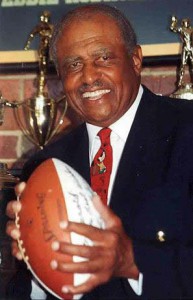
Legendary Coach Eddie G. Robinson has been named the American Football Coaches Association’s (AFCA) recipient of the 2015 Trailblazer Award. The award will be presented posthumously at the AFCA President’s Kickoff Luncheon on Monday, Jan. 11 at the 2016 AFCA Convention in San Antonio, Texas. Robinson passed away in 2007 at the age of 88.
The AFCA Trailblazer Award was created to honor early leaders in the football coaching profession who coached at historically black colleges and universities. Past Trailblazer Award winners include Charles Williams of Hampton (2004), Cleve Abbott of Tuskegee (2005), Arnett Mumford of Southern (2006), Billy Nicks of Prairie View A&M (2007), Alonzo “Jake” Gaither of Florida A&M (2008), Fred “Pops” Long of Wiley (2009), Harry R. “Big Jeff” Jefferson of Bluefield State (2010), Edward P. Hurt of Morgan State (2011), Vernon “Skip” McCain of Maryland-Eastern Shore (2012), Marino Casem of Alcorn State (2013) and Gideon Smith of Hampton (2014). The award is given each year to a person that coached in a particular decade ranging from 1920-1970. This year’s winner coached from 1941 to 1970.
Robinson attended Leland College in Baker, La., where he played quarterback and led the team to a combined 18–1 record over the 1939 and 1940 seasons. During his final two years at Leland, he also served as an assistant coach. He earned his bachelor’s degree in 1941 and received a master’s degree from the University of Iowa in 1954.
In 1941, Grambling, then known as Louisiana Negro Normal and Industrial Institute, hired Robinson to coach football and basketball and teach physical education. In his first season, he had no assistants and no budget for replacing equipment. He handled virtually everything himself, from mowing the field to taping players’ ankles to writing accounts of the games for the local newspaper. That season, his team posted a record of 3-5. The next season, however, he guided the team to a perfect 8-0 record.
Robinson spent 57 seasons consistently fielding stellar football teams and guiding his young charges to successful lives both on and off the gridiron. After surpassing Amos Alonzo Stagg’s 314 coaching victories in 1984, he tied legendary Alabama coach Paul “Bear” Bryant’s 323-win mark with a 23-6 win
over Oregon State before becoming the career wins leader the next week with a 27-7 win over Prairie View A&M. He earned an unprecedented 408 college football victories, which is second behind Joe Paterno in Division I history. Coach Robinson retired with nine Historical Black College and University national championships, 19 Southwestern Athletic Conference (SWAC) titles and an overall record of 408-165-15.
Robinson produced more than 200 players who went on to play professional football, most notably, Buck Buchanan, Willie Brown, Charlie Joiner and Willie Davis, who are enshrined in the Pro Football Hall of Fame. He coached over 4,000 student-athletes, of which over 80 percent received their college degrees.
In addition to being recognized as the 2015 AFCA Trailblazer Award recipient, Robinson received the 1982 AFCA Amos Alonzo Stagg Award and was the first active coach to receive the AFCA’s highest honor, the Tuss McLaughry Award, which was awarded to him in 1996. The Football Writers Association of America’s Eddie Robinson Coach of the Year Award is named in his honor, and Grambling also named its football facility, Eddie Robinson Stadium, after him. Robinson was inducted into the College Football Hall of Fame in 1997, the SWAC Hall of Fame in 1992 and the National Association of Intercollegiate Athletics Hall of Fame in 1976. Robinson also served on the AFCA Board of Trustees from 1971 to 1975 and served as the AFCA President in 1976.
The AFCA was founded in 1922 and currently has more than 11,000 members around the world ranging from the high school level to the professional ranks. According to its constitution, the AFCA was formed, in part, to “maintain the highest possible standards in football and in the coaching profession” and to “provide a forum for the discussion and study of all matters pertaining to football.”
###
Media Contact:
Office of Communications
318-274-2866
mediarelations@gram.edu

